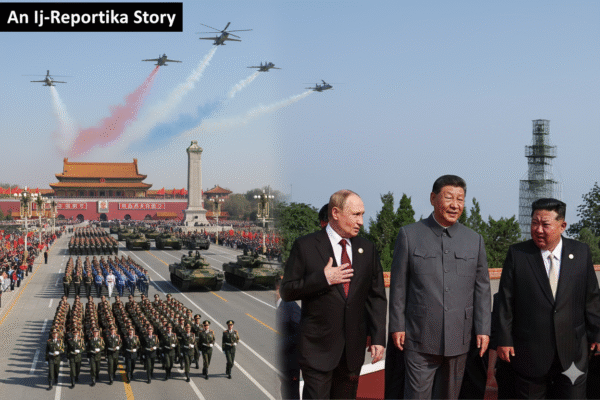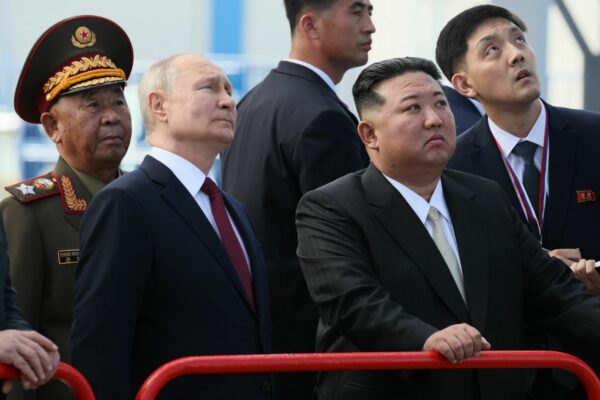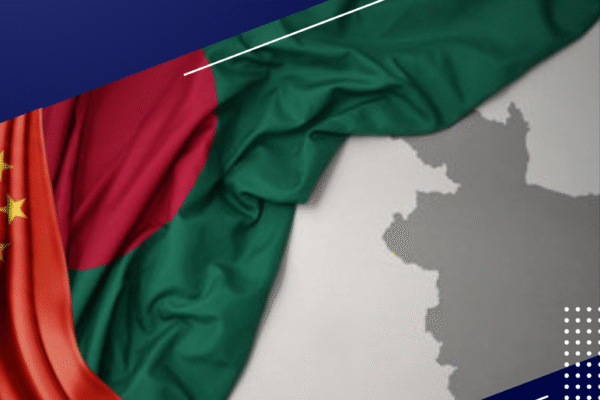
Category: East Asia

Chinese-Built $2 Billion Airport Opens Near Phnom Penh
The inaugural flight — an Air Cambodia plane from China — was greeted with a ceremonial water salute, marking the official opening of the three-runway, 10-square-mile airport located about 20 kilometers (12 miles) from the capital.

U.S. House passes Uyghur Policy Act supporting victims of persecution by China
WASHINGTON — The House passed the Uyghur Policy Act on Tuesday, a bill that advances a strategy for the United States to support Uyghurs and other ethnic minorities enduring persecution at the hands of China’s government.

Kim, Putin, Xi share world stage at China’s military parade
Enormous intercontinental ballistic missiles, new underwater drones, laser weapons and other military hardware paraded across Beijing’s Tiananmen Square for 90 minutes on Wednesday — a commemoration of 80 years since the Japanese surrender that ended World War II and a showcase of modern Chinese military might.
North Korea’s Kim Jong Un arrives in Beijing for military parade
North Korean leader Kim Jong Un arrived in Beijing on Tuesday, ahead of a massive Chinese military parade on Wednesday that will celebrate 80 years since the Japanese defeat that ended World War II. Kim and his daughter Kim Ju Ae arrived at around 4 p.m. on a green train bedecked with North Korean flags. They were met at the Beijing train station by Cai Qui, China’s fifth-highest ranked official, and foreign minister Wang Yi. It’s the North Korean leader’s second reported trip abroad in six years, and his first trip to China since 2019. The event at Tiananmen Square is expected to include troops marching in formation, aircraft flyovers, displays of military equipment and some 50,000 spectators. But many eyes will be on the VIP audience, where Kim is expected to rub shoulders with Chinese President Xi Jinping and Russian leader Vladimir Putin, among others. While Kim has engaged bilaterally with Xi and Putin in recent months, this will be their first gathering together. Analysts say they’ll be looking for signs of strengthening ties among the three countries. Earlier on Tuesday, Xi met with Putin at the Great Hall of the People and then again at his residence. That followed a summit on Monday in which Xi and Putin met with leaders from more than 20 non-Western countries. Among them was Narendra Modi, the prime minister of India, who talked with both Xi and Putin. Includes reporting from Agence France-Presse and Reuters. We are : Investigative Journalism Reportika Investigative Reports Daily Reports Interviews Surveys Reportika

North Korea’s Kim Jong Un to attend military parade in China
Chinese President Xi Jinping extended Kim’s invitation to the event, which marks 80 years since Japan’s surrender in World War II, North Korean state media reported Thursday. Kim will be among 26 foreign leaders who are expected to attend, including Russian President Vladimir Putin.

Damaged Chinese ship now under repair, satellite images show
The Chinese coast guard ship that was damaged in a collision with another Chinese vessel in the South China Sea earlier this month is now being repaired at Hainan Island, according to satellite images published by Reuters.

Chinese Influence Operations in Bangladesh
China’s influence in Bangladesh is expanding beyond trade and infrastructure into media, academia, and social networks. This report uncovers how Beijing’s propaganda and soft power strategies are reshaping narratives, fueling pro-China sentiment, and amplifying anti-India rhetoric across the country.
Philippine defense chief condemns Chinese activity near Second Thomas Shoal
China has deployed an array of armed coast guard forces near the disputed Second Thomas Shoal in the South China Sea — one in a series of Chinese actions that the Philippines’ defense chief on Friday called “a matter not only of concern but of condemnation.” Philippine Defense Secretary Gilberto Teodoro spoke Friday during a joint press conference with Richard Marles, the defense chief for Australia, as the two countries engaged in combat drills that began Aug. 15 and worked toward an enhanced joint defense pact. “We work really closely with the Philippines in terms of asserting the rules-based order in the South China Sea,” Marles said. “That’s really important for us to jointly do.” The Philippine military reported this week that China has deployed coast guard and militia ships in the area, as well as a cadre of speedboats, some fitted with high-caliber machine guns. A helicopter and a drone were also reported in the area. According to the Philippine report, one of China’s boats came within 50 meters of the Sierra Madre, a warship that the Philippines deliberately grounded in 1999 to serve as a base of operations on Second Thomas Shoal. Two Filipino boats were deployed to keep the Chinese from coming closer, the Philippine military said. Philippine Defense Secretary Gilberto Teodoro, right, shakes hands with his Australian counterpart Richard Marles prior to their meeting at a hotel in Makati, Philippines, on Friday, Aug. 22, 2025. (AP Photo/Aaron Favila)(Aaron Favila/AP) China’s coast guard on Friday released a statement warning the Philippines to “immediately stop all infringement activities, provocations and false accusations” in the area, saying it would continue to “carry out law enforcement activities.” The Philippines and China have long fought and negotiated over territory in the South China Sea. Second Thomas Shoal sits within the Philippines’ U.N.-defined exclusive economic zone. It’s also within the wide swath of the sea that China claims as part of its maritime territory. In March, the Philippines accused China of “deceptive messaging” after state-run television accused the Philippine military of burning trash aboard the Sierra Madre. Last June, members of China’s coast guard used pikes and machetes to puncture Philippine boats and seized firearms during a Philippine mission to resupply the Sierra Madre. By December, China said it had granted permission for such resupply missions on humanitarian grounds. Philippine fishermen told RFA’s BenarNews last year that the heavy presence of Chinese vessels caused them to send out fewer boats, leading to a reduced catch and economic hardship. Includes reporting from The Associated Press. We are : Investigative Journalism Reportika Investigative Reports Daily Reports Interviews Surveys Reportika
RFA wins two National Murrow awards for Myanmar coverage
Recognition comes as military junta and China dominate Burmese information space WASHINGTON – Radio Free Asia (RFA) has won two National Edward R. Murrow awards for chronicling the struggles facing young people from post-coup Myanmar. The recognition for this coverage comes as RFA was forced to suspend much of its news-gathering operations due to the U.S. Agency for Global Media’s illegal cancellation of its grant and RFA’s uncertain future. “It is hard to believe that right now, Myanmar’s media is dominated by its military junta and China,” said Bay Fang, RFA President and CEO. “Challenging those narratives through hard-hitting, fact-based reporting has been RFA’s mandated mission by the U.S. Congress. “These awards serve as a stark reminder of RFA’s critical role in the Asia-Pacific region even as many of our language services, including RFA Burmese, have gone silent.” The multimedia feature Myanmar’s Gen-Z fighting for a nation’s future, produced last November, includes videos, images and text profiling the challenges and resilience of the generation coming of age after the February 2021 military takeover. An RFA team based outside the country returned to Myanmar to speak to people on the front lines in one eastern region to learn about their stories – and their hopes for the revival of their blood-stained country. More than three years of fighting has displaced more than 3 million people inside the country, and refugees continue to spill across borders to the west, south and east. While the military maintains control of the country’s largest cities, anti-junta forces have made unprecedented territorial gains. A 2023 survey of Myanmar found more than 5.1 million Myanmar adults accessed RFA content regularly either online or through shortwave broadcasts. The awards will be presented by the Radio Television and Digital News Association in New York on the evening of October 13. State of play at RFA: Until March, RFA was one of the only international outlets to have a sustained in-country presence since the 2021 military coup. RFA’s Burmese Service was forced to stop operations after the USAGM in March 2025 illegally cancelled the grant that funds Radio Free Asia. At present, 90 percent of RFA’s staff has been either put on unpaid leave or has resigned. RFA continues to fight the illegal termination of its grant funds. The matter is currently being litigated in the DC Circuit Court of Appeals, with a hearing scheduled for late September. We are : Investigative Journalism Reportika Investigative Reports Daily Reports Interviews Surveys Reportika


